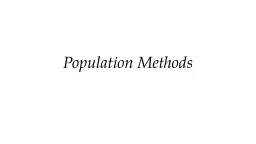PPT-Theory and Methods
Author : karlyn-bohler | Published Date : 2016-06-11
wwweducationforumcouk Positivism Positivists see sociology as a science They seek to discover the objective social laws which cause patterns in social behaviour
Presentation Embed Code
Download Presentation
Download Presentation The PPT/PDF document "Theory and Methods" is the property of its rightful owner. Permission is granted to download and print the materials on this website for personal, non-commercial use only, and to display it on your personal computer provided you do not modify the materials and that you retain all copyright notices contained in the materials. By downloading content from our website, you accept the terms of this agreement.
Theory and Methods: Transcript
Download Rules Of Document
"Theory and Methods"The content belongs to its owner. You may download and print it for personal use, without modification, and keep all copyright notices. By downloading, you agree to these terms.
Related Documents














